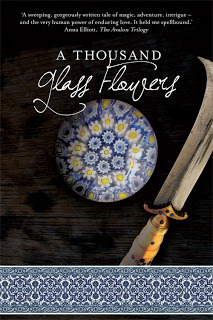Stuart Aken's Blog, page 294
August 13, 2011
West End Girls, by Barbara Tata, Reviewed.
 A book variously described as a memoir, a biography and anautobiography, West End Girls details the lives of Soho prostitutes through theeyes of a virginal, innocent but forthright narrator (I have great empathy withthe author, as I used a similar narrator in my novel, Breaking Faith, so my reviewcould be a little biased; please bear that in mind). Written with humour and displaying an extraordinary naivetymixed with a growing worldliness developed along the journey, this memoir isfull of empathy for the girls and young women the author meets, befriends and serves.Set just after World War II, the atmosphere is remarkably evocative andbrilliantly brought to life by Barbara's candid observations. If you're a manreading this, be warned: men do not come out well from this volume. The author'sview of the gender is clearly skewed by her exposure to those men whohabitually resort to the services of prostitutes, so it is hardly surprisingthat she has a somewhat one-sided view of us. Only later in life did she meetand marry a man who was able to balance her view and, to give her credit, sheclearly realised that her former attitude was rather biased.I read this book with a growing sense of amazement at thepeculiarities of the human condition and the sexual proclivities of both menand women. I'm no innocent; though my only exposure to prostitutes has beenaccidental contact: once whilst looking for a photography business in Southendand once whilst hitch-hiking through London. On neither occasion was I temptedto take up their offers of 'comfort'. Barbara has introduced me to the idea ofthe prostitute's 'maid', a sort of bodyguard-cum-accountant-cum-generaldogsbody; something I had not previously encountered, even through fiction. Shealso talks of 'ponces', the Soho equivalent of the 'pimp', which in her era hada slightly different meaning.Her accounts of her own life and those of the women ofpleasure around her are warm, detailed and almost impartial. The descriptionsof Soho, especially the underbelly where these women operate, are full ofobservations that bring the shoddy, shabby but superficially glamorous place tolife. The author was a gifted artist and this shows through in her acuteobservations, her ability to paint a picture with words.Her gradual loss of innocence, though she is neverphysically corrupted, permeates the account and allows her to provide more andmore detail of actual events. However, she shows a distinctly personal view ofwhat she can and cannot write for public consumption, so that her narrative isfull of unanswered questions to which the reader suspects she has almost tooany answers.Given that this is story of the lives of people engaged in asordid lifestyle for all sorts of reasons, it manages to rise above the murkand muck to provide a picture of a warm, generous and affectionate world,albeit peppered with violence, usage and abuse.I am glad I read this, both as writer and reader, and haveno hesitation in recommending it to all but those with insincere pretentions tosensitivity.
A book variously described as a memoir, a biography and anautobiography, West End Girls details the lives of Soho prostitutes through theeyes of a virginal, innocent but forthright narrator (I have great empathy withthe author, as I used a similar narrator in my novel, Breaking Faith, so my reviewcould be a little biased; please bear that in mind). Written with humour and displaying an extraordinary naivetymixed with a growing worldliness developed along the journey, this memoir isfull of empathy for the girls and young women the author meets, befriends and serves.Set just after World War II, the atmosphere is remarkably evocative andbrilliantly brought to life by Barbara's candid observations. If you're a manreading this, be warned: men do not come out well from this volume. The author'sview of the gender is clearly skewed by her exposure to those men whohabitually resort to the services of prostitutes, so it is hardly surprisingthat she has a somewhat one-sided view of us. Only later in life did she meetand marry a man who was able to balance her view and, to give her credit, sheclearly realised that her former attitude was rather biased.I read this book with a growing sense of amazement at thepeculiarities of the human condition and the sexual proclivities of both menand women. I'm no innocent; though my only exposure to prostitutes has beenaccidental contact: once whilst looking for a photography business in Southendand once whilst hitch-hiking through London. On neither occasion was I temptedto take up their offers of 'comfort'. Barbara has introduced me to the idea ofthe prostitute's 'maid', a sort of bodyguard-cum-accountant-cum-generaldogsbody; something I had not previously encountered, even through fiction. Shealso talks of 'ponces', the Soho equivalent of the 'pimp', which in her era hada slightly different meaning.Her accounts of her own life and those of the women ofpleasure around her are warm, detailed and almost impartial. The descriptionsof Soho, especially the underbelly where these women operate, are full ofobservations that bring the shoddy, shabby but superficially glamorous place tolife. The author was a gifted artist and this shows through in her acuteobservations, her ability to paint a picture with words.Her gradual loss of innocence, though she is neverphysically corrupted, permeates the account and allows her to provide more andmore detail of actual events. However, she shows a distinctly personal view ofwhat she can and cannot write for public consumption, so that her narrative isfull of unanswered questions to which the reader suspects she has almost tooany answers.Given that this is story of the lives of people engaged in asordid lifestyle for all sorts of reasons, it manages to rise above the murkand muck to provide a picture of a warm, generous and affectionate world,albeit peppered with violence, usage and abuse.I am glad I read this, both as writer and reader, and haveno hesitation in recommending it to all but those with insincere pretentions tosensitivity.
Published on August 13, 2011 09:00
Stuart's Daily Word Spot: Jackal
 Jackal: noun - awild omnivorous doglike mammal of Africa and S. Eurasia, from the genus Canis, havingerect ears and bushy tail, hunting in packs as foragers; someone acting like ajackal, doing subordinate preparatory work or drudgery for someone else.
Jackal: noun - awild omnivorous doglike mammal of Africa and S. Eurasia, from the genus Canis, havingerect ears and bushy tail, hunting in packs as foragers; someone acting like ajackal, doing subordinate preparatory work or drudgery for someone else.'It's said, amongst those who are supposed to know thesethings, that a pack of hungry jackals is far more dangerous than a lone bigcat.'
'Christopher does all the footwork, serving as Fiona'sjackal and gathering all the facts together so she can do the more interestingcollation work.'
Pic: Hay Wold, East Yorkshire.
Published on August 13, 2011 07:00
Fame or Fortune ... Which Would You Prefer?
 Fame or fortune? Both? Or neither?
Fame or fortune? Both? Or neither? A contribution to the Blog-a-Licious Blog Tour
It's a common idea that we all seek either or both of thesequalities in our lives. But is it something we'd really want? We take forgranted the benefits of such qualities but tend to ignore the downside. Isthere one? Well, when it comes to fame, I don't know about you, but I'd hate tobe recognised everywhere I went. How could I listen in to those delightful andintriguing snippets of conversation that inform my writing, if I was recognisedas a writer? In fact, I kept my craft secret even from colleagues at work untilI had Breaking Faith published and needed to market the novel. The idea of moblove doesn't appeal to me at all, either. I'm happy with the real love of thosearound me; those I know and love. So, fame is definitely not for me.
But (and, as they say, it's a big butt), I DO want my workto be famous. I want it to reach the largest possible readership because Ibelieve that what I write is worth reading. Otherwise, I wouldn't do it, wouldI? It's one of the reasons I use a pen name. I can walk into any shop, hotel,restaurant or wherever, use my own name and know I won't be known. But, whenthe world recognises my genius (yes, it's possible I'll be dead by then, Iknow.) my writing name will be universally known, respected and admired. (Forthe Americans amongst my readers, I should perhaps explain that I'm employingirony here. We Brits have the irritating conviction that most Americans have nounderstanding of irony and don't recognise it, you see).So, fame for my work, but not for me, thanks.
And fortune?
Money has never really had a hold over me; not in quantity.But, then, I've never had a lot of money, so I have no experience of itssupposed benefits. I look at the rich around me and in the media and see howshallow and selfish many of them are. I see how they have lost their knowledgeof the real world; those who had such knowledge in the first case, that is. Isee how their love of materialism and wealth has ruled and governed their livesand their choices and I feel little admiration and a great deal of distaste.Oh, I know some of them are generous with donations to charities and the like.But it makes me wonder, when a rich celebrity makes a plea to raise a certainsum for a specific project to alleviate suffering, why they don't simply donateit themselves. It so frequently has the appearance of someone trying to lookgood rather than actually be good. I hold a belief that, as we should have aminimum income for all worldwide, we should also have a maximum income for all.It is inequalities in society that cause most discontent and the wider they arethe greater that dissatisfaction.
So, yes, I'd like enough money to be able to live therelatively simple lifestyle I espouse and to give my daughter a good start inlife. But I don't crave the sort of fortune that distorts an individual's viewof the world to such an extent that they no longer understand the lot of mostpeople.Sorry, this has become rather serious, hasn't it? My passionssometimes run away with me. I'm sure you'll find a lighter touch in the othercontributions to this blog tour. So move on to the next and enjoy the tour.Thanks for your time and bruised ears. I'll take my soap boxaway now and find another crowd to harangue.
Next blog along is http://dilmandila.blogspot.com
Published on August 13, 2011 00:32
August 12, 2011
Stuart's Daily Word Spot: Less or fewer?
 Lessor fewer? Themisuse of these two words is far more common than it need be, even at the handsof so-called professional journalists. The distinction is relativelystraightforward and the mix-up probably results from the fact that we tend touse 'less' for more or less all situations.
Lessor fewer? Themisuse of these two words is far more common than it need be, even at the handsof so-called professional journalists. The distinction is relativelystraightforward and the mix-up probably results from the fact that we tend touse 'less' for more or less all situations.'Less'should be used for quantities that cannot be counted. So, for example, conceptsand qualities generally can't be counted and you would say (or write) 'lessfreedom', 'less love', 'less crime' (when referring to the general activityrather than to the individual criminal acts).
'Fewer'is used for all situations where the items or objects can be counted. So youwould write or say, 'fewer privileges', 'fewer lovers', 'fewer murders'.
'Ittook less time than Jennifer expected to get rid of Jeffrey and suddenly shehad fewer lovers.'
'Jeffreywas less concerned about Jennifer's clothes than she was and he soon had herbody covered by fewer garments.'
Thinkabout it like this: if it's possible to have a few of them, use 'fewer'.But,if you can't count individual items, use 'less'.
12 August 1981 – IBM launched the PC.
Pic: Ripening corn.
Published on August 12, 2011 07:00
La Scala Studios Short Story Competition 2011
 Pippa Ireland presenting prize in 2010 to E HeadlandI took part in thiscontest last year, and won a prize. The judges are well-selected for thiscontest and the prizes are many and varied. If you enjoy writing contest, I'dadvise a go at this one SA.
Pippa Ireland presenting prize in 2010 to E HeadlandI took part in thiscontest last year, and won a prize. The judges are well-selected for thiscontest and the prizes are many and varied. If you enjoy writing contest, I'dadvise a go at this one SA.Following the success of last year's competition, La ScalaStudios is pleased to launch another short story competition this year. Entryis open to all, with special prize sections for Pony Club and Riding Clubmembers, Yorkshire residents and racing themed stories. This is a competitiondesigned to encourage creativity, especially in the young. We are grateful toall those sponsors from last year who have come on board again this year togenerously support this important competition, and we welcome the new sponsorsthat have pledged their support this year. Also, we are delighted thatJefferies Saddlery have taken over as the major sponsor which includes the choiceof one of their superb saddles for the winner of the first prize in theequestrian section. Moreover, we are also pleased to announce that the judgeswill once again include Penny Grubb,the award winning author, and JohnFairley of ChannelFour Racing. So all you need to do is get writing!
PRIZES FOR OPEN SECTION1st Prize:£2002nd Prize:£1003rd Prize:£50PRIZES FOR EQUESTRIAN SECTION[/size1st Prize - A brand new saddle of the winner's choice fromthe Jefferies Saddlery range2nd Prize - A brand new English leather bridle from JeffriesSaddlery3rd Prize - A pass to the Bramham International Horse Trials2012Runners up prizes in the major sections include: Insurancevouchers, a polo lesson, a specialist equine infrared treatment, saddlery shopvouchers, a gift pack from renowned artist Susan Alison
Yorkshire residents:1st Prize - A day bout at the Great Yorkshire Show 2012 plusa signed copy of The Jawbone GangRunner up - A day out at Beverley Races (lastyear, I won this prize and had a very interesting day out to a venue I wouldn'tnormally have visited SA).Best entry from a Pony Club and Riding Club member each winsa high quality plastic moulded hay Best entry from a Yorkshire Pony Club member wins an equineinfrared treatment
BEST RACING THEMED STORY PRIZE:
A VIP day out at the races at any of the followingracecourses: Doncaster, Folkestone, Lingfield Park, Royal Windsor, Southwell,Worcester or Wolverhampton on a date of the winner's choice (excludingDoncaster's St Ledger Festival, Lingfield's Sportingbet Winter Derby, orTotesport Derby Trial). The prize includes a 3-course lunch or dinner with abottle of champagne in one of Arena's premiere viewing restaurants, with atable for the day, racecards, premiere badges and car parking. The winner'sparty will be offered a visit to the paddock with a racecourse executive, and amini behind the scenes tour of the weighing room and pre-parade room, wherethey might get to chat with the jockeys.
For more writingcontests click this link.
Published on August 12, 2011 02:00
August 11, 2011
Author Interview with Prue Batten
 Hello Prue, please tell us about you, as awriter.
Hello Prue, please tell us about you, as awriter.Hello Stuart and thank you so much for having me here onyour blog.Like many writers, I have been writing since I was young andthat's a looong time ago. For me, it was a form of emotional fulfilment, anescape and of course the obvious… a creative outlet. It's interesting that as achild I learned ballet, had art classes and learned to horse-ride but at notime did I have a chance to learn the craft of writing because there was nosuch thing for primary school children. It was merely something that wasvaguely alluded to in English at school under the rather generalised title of'composition'. All I knew was that when I was told we had 'composition', myheart sang and I would write like a devil possessed.
Your book A Thousand Glass Flowers is a fantasy. Perhaps you'd you give ussome insight into it in a few sentences.
Okay, here goes:
 Driven by the knowledge thatcharms exist that could kill the one remaining member of her mortal family inEirie, Lalita Khatoun is desperate to find and destroy the infamous Cantrips ofUnlife. Finnian, an Other, hunted by his insane grandmother after he fails in amurderous attempt on her life, is convinced the only thing that will rid him ofher are those same cantrips and he too is desperate to find them. Fatecontrives that Lalita and Finnian should seek together. In an ominous questthrough a world where spine-tingling Others lace their way in and out of thelives of mortals, it's a story of legend, love, and clashing ideals; a story ofmurder, regret and revenge… a story that journeys across a world too hauntinglylike our own.
Driven by the knowledge thatcharms exist that could kill the one remaining member of her mortal family inEirie, Lalita Khatoun is desperate to find and destroy the infamous Cantrips ofUnlife. Finnian, an Other, hunted by his insane grandmother after he fails in amurderous attempt on her life, is convinced the only thing that will rid him ofher are those same cantrips and he too is desperate to find them. Fatecontrives that Lalita and Finnian should seek together. In an ominous questthrough a world where spine-tingling Others lace their way in and out of thelives of mortals, it's a story of legend, love, and clashing ideals; a story ofmurder, regret and revenge… a story that journeys across a world too hauntinglylike our own.How did you come to write this particularbook?
I've always been inspired by oddthings: stumpwork embroidery, miniature books, pocketglobes, intricately wovenfabric and in this particular case… paperweights. It was only a small step toimagine something dastardly and secret concealed within these things and for aballad or myth to be created.
Do you have a favouritecharacter from the book? If so, who and why this particular one?
I think Lalita is a woman to beadmired. Such loss and grief should have pitched her into a breakdown! Butshe's a determined, feisty woman who knows how to handle a dagger and inaddition, she's a calligrapher and bookmaker and I once learned to book-bind atArt School so Lalita is dear to my heart. As for the co-protagonist, Finnian,he is a damaged man… attractive, dark and infinitely dangerous and could killLalita with a flick of his fingers, but…
Where can people buy your books?
All my books both in hard copyand e-format are available at Amazon.com http://amzn.to/ks8C6iand Amazon.co.uk http://amzn.to/m01qxa aswell as for Apple, Kobo, Nook etc. A Thousand Glass Flowers will be released inSeptember and I suggest readers keep an eye on my blog (see below) for details.
What qualities does a writer need to besuccessful?
Success is relative, I think. Forme it's the creation of a story that can take people out of themselves and far,far away. But in addition, that story has to be backed up by credible skills,by application, by research and dedication. In short, a form of obsession.
What's the single biggest mistake made bybeginner writers?
Its difficult to generalise butit would perhaps help to show what my own mistake was. A thing called Point ofView. My POV would jump from one character to another in the space of aparagraph. It's rarely handled well and can lead to a jumpy, incoherentnarrative. It's still the thing that terrifies me the most.
To what extent are grammar and spellingimportant in writing?
Vital. Vital, vital, vital!Enough said.
How much do you revise your MS beforesending it off?
A hundred times and then I couldrevise a hundred times again. I honestly believe that any writer, published ornot and re-reading their work in the future, will find things they could reviseand write with more polish.
As a writer of fantasy and historicalfiction, to what extent do you think genre is useful in the publishing world?
This is a bête noire for me. Genre is necessary to catalogue a work but thereare so many subgenres that are rarely used that would make selection easier fora discerning reader. Take Glass Flowers. It's fantasy. But if I could, I wouldclassify it as any or all of fantasy ballad, fantasy romance or magicalrealism.
Many authors see marketing as a bind. What'syour opinion on this, and how do you deal with it?
It's a necessary part of the lifeof a published writer. Of course I would rather be writing but I'm able toengage with many readers as part of the marketing process and so manyrelationships have been formed with kindred spirits.In terms of dealing with it, it'svery difficult because I live in the southern hemisphere and most of my readersare in the northern hemisphere. In order to engage properly, I should be awakeall night and chatting on the internet! Suffice to say I do what I can andshould do more and should have a timetable but I don't.
What's your working method?
I research what has to beresearched. I read monographs and internet detail. I use sticky notes a lot.Then I bullet-point my story with pen and paper. My characters have a stylefile including a photo of any likely face I have seen that fits. I also have astyle sheet that I divide into squares in alphabetical order and into which Idrop words so that spelling of names, places etc remains consistent. I writemostly on the computer but sometimes I have ideas in bed or in the bath orwalking and I will jot those down. Sometimes I wake in the middle of the nightand will write pages in pen, taking off from where I stopped on the computer. Iwill then type that up next day. I edit the previous day roughly. When thestory is finished, I edit on the screen and then print a hard copy and editthat with red pen and sticky notes. I send it off to London and when it comesback, I edit (and sometimes re-write chapters) again. Until it gets the seal ofapproval.
What sort of displacement activities keepyou from writing?
I do love that term:displacement. My husband and I are farmers, growing the superfine merino woolfor which Australia is famous, so that displaces me more than I want! Inaddition I have dogs I adore, I volunteer as a dog walker at our local dogs'shelter, I am an obsessive embroiderer, I love the beach and the sea and spenda lot of time on and in the water.
What support, if any, do you receive fromfamily and friends, or a writing group?
My family are supportive, myhusband chiefly so. He is my backbone, my agent and my financial adviser. Myfriends are marvellous… beta readers of the best kind. I'm a member ofYouWriteOn.com and have found the peer-review process to be the best sort ofwriting group.
Is presentation of the MS as important asagents and publishers suggest?
Indeed. If one wishes to submitmainstream. After a period of time submitting, I decided to go the indie routeand such presentation has stood me in good stead for any other publishingmethod I might follow.
How long does it take you to write a novel?
Taking into account the fact thatI submit to an editorial consultancy in London, to bring the novel to the pointwhere it's considered commercially viable, it takes me two years.
Who or what inspires your writing?
My emotions and a feeling ofwriting what I need to. It's the oddest sort of motivation. I'm an eclecticreader and because of that, I couldn't honestly say it was one writer more thanany other that inspires me. That said; I love Shakespeare's plays and sonnets.I love Yeats. I admire Dorothy Dunnett's historical fiction and of course, JaneAusten is a given.
If there's a single aspect of writing youfind frustrating, what is it?
Line-editing… it's excruciatingand I always worry I've missed something.
Is there a particular feature of writingthat you really enjoy?
Two things. Research because I amconstantly learning and characterisation because the characters become real andit thrills me to see what happens to them. I think I might be a voyeur!
Do you believe creative writing is a naturalgift or an acquired skill?
Being creative is a gift. Being awriter can be an acquired skill. To be a creative writer, you simply MUST havethe imagination.
What are you writing now?
A historical fiction calledGisborne and based on the legendary Sir Guy of Gisborne. This is my take onwhat he may have been and what he might have become in different circumstances.The novel will be released for Christmas 2011.
Do you have a website or blog where readerscan visit?
I do. My website is merely aninformative site (http://www.pruebatten.com)but my blog is interactive and welcomes all comers. (http://www.mesmered.wordpress.com)I'm also on Twitter if anybody tweets: @pruebatten and on Facebook: Prue Batten
 Given unlimited resources, where would youdo your writing?
Given unlimited resources, where would youdo your writing?Exactly where I do it now… exceptmaybe the room would be much more of a library room than currently… shelves onall four walls and filled to the brim with books of interest, a sliding ladder,an illuminated manuscript on a lectern, tellurions, and orreries.
Where do you actually write?
At home, I write on a laptop on acouch because I love the sunshine through the window and the birds-eye view ofthe Derwent River and the city of Hobart. All my books and research are inanother room and I jump up and down. It's good exercise. But when we are at ourtiny cottage by the sea, I have a table by a window (also masses of sunshine) whereI can look out at the garden and hear the waves and the seabirds. Sometimes inboth instances, the view can be a little distracting.
Published on August 11, 2011 08:30
Stuart's Daily Word Spot: Trope
 Trope: aliterary figure of speech. Tropes are often used to refer to familiar literarydevices such as metaphors and other types of figurative language.
Trope: aliterary figure of speech. Tropes are often used to refer to familiar literarydevices such as metaphors and other types of figurative language.This is a subtle topic and one I can best explain by usingthe lazy man's approach of pointing you in the direction of someone else'sdefinition. So, I give you this link and hope you'll forgive my indolence onthis occasion: http://grammar.about.com/od/tz/g/tropeterm.htm
It is worth viewing this site, though. And the examplesgiven lower down the page say it much better than I could.
Pic: Grain crop ready for harvesting.
Published on August 11, 2011 07:59
August 10, 2011
Stuart's Daily Word Spot: Icauna
 Icauna: Another of my occasional god/goddess entries,displayed in the hope of helping people understand that religion is neitherexclusive nor especially mystical.
Icauna: Another of my occasional god/goddess entries,displayed in the hope of helping people understand that religion is neitherexclusive nor especially mystical.
Icauna is a Romano-Celtic (Gallic) goddess who is knownonly from a single inscription, which was discovered at Auxerre, Yonne, France.She appears to be the patroness or guardian of the Yonne River, named after her.The name may well be derived from Celtic root iskā- forwater and may be intended to describe the 'flowing' action of a river. The Celts were very keen onwater goddesses and made offerings to them, often in the form of discardedweapons, coins and other items with some value, which were tossed into thewaters in the hope of favours from the deities thus petitioned.Call me an old cynic, but Ican't quite cleanse my mind's eye of the picture of some old scoundrel hidingby the banks of such streams, pools and marshes, waiting for the supplicants togo back to their normal activities, leaving the way clear for the scoundrel toretrieve the objects of value so he/she can sell them.
Pic: Trout stream in Driffield.
Published on August 10, 2011 07:00
August 9, 2011
Stuart's Daily Word Spot: Lay or lie?
 Lay or lie?Ifyou 'lay' something down, you put it in place. The long 'a' sound gives theclue.Ifyou 'lie' down, you recline. Here, the long 'i' sound should help you remember.
Lay or lie?Ifyou 'lay' something down, you put it in place. The long 'a' sound gives theclue.Ifyou 'lie' down, you recline. Here, the long 'i' sound should help you remember.Thisis a topic on which reams of paper have been devoured, so I'm not going toexpand on this one. I will, however, give a few examples, in the hope thesewill be of help.
'Laydown and have a rest.''Shelay serene and still in the wild waving grass and dreamt of her heroapproaching on a stallion of purest white.'But:'He laid her on the couch and took advantage of her ready availability.''Goto your room and lie in bed until I come up to tell you a story.''Whenyou lie on the couch like that, you give me ideas.'
Pic: Port Mulgrave, North Yorkshire
Published on August 09, 2011 08:00
August 8, 2011
The Remains, by Vincent Zandri, Reviewed.
 A 30 year old sex crime haunts this story of irrationalrevenge, obsession and predation. Identical twins star, with the living sisterproviding a point of view character, surprisingly well-created by the maleauthor. The unlikely savant hero and the rejected husband make fascinating maleprotagonists in a tale that twists and turns its way to a final, almostinevitable, climax.Along the way, the reader is treated to depictions of theMaine landscape that contain threat as well as charm. The author's insight intothe workings of the savant's restricted genius takes us into a world bothstrange and intriguing. The heroine, although suffering the consequences of herpart in a criminal traumatic incident during childhood, grows through the storyto learn courage and increased self-esteem. It is interesting that, in this novel, which is essentiallya crime thriller, neither the criminal nor the investigating officer take prominentroles. However, the emotional and threatening influence of the sinister madmancause an undercurrent of unease and menace throughout the tale.The denouement, beginning quite early on for this genre,builds through several climaxes, each brining its own tensions and apparentclosure. The final scene is both satisfactorily inevitable and surprising. This is a novel that moves (in both senses of the word),scares and intrigues and is one I'd class as a damned good read.
A 30 year old sex crime haunts this story of irrationalrevenge, obsession and predation. Identical twins star, with the living sisterproviding a point of view character, surprisingly well-created by the maleauthor. The unlikely savant hero and the rejected husband make fascinating maleprotagonists in a tale that twists and turns its way to a final, almostinevitable, climax.Along the way, the reader is treated to depictions of theMaine landscape that contain threat as well as charm. The author's insight intothe workings of the savant's restricted genius takes us into a world bothstrange and intriguing. The heroine, although suffering the consequences of herpart in a criminal traumatic incident during childhood, grows through the storyto learn courage and increased self-esteem. It is interesting that, in this novel, which is essentiallya crime thriller, neither the criminal nor the investigating officer take prominentroles. However, the emotional and threatening influence of the sinister madmancause an undercurrent of unease and menace throughout the tale.The denouement, beginning quite early on for this genre,builds through several climaxes, each brining its own tensions and apparentclosure. The final scene is both satisfactorily inevitable and surprising. This is a novel that moves (in both senses of the word),scares and intrigues and is one I'd class as a damned good read.
Published on August 08, 2011 11:00



